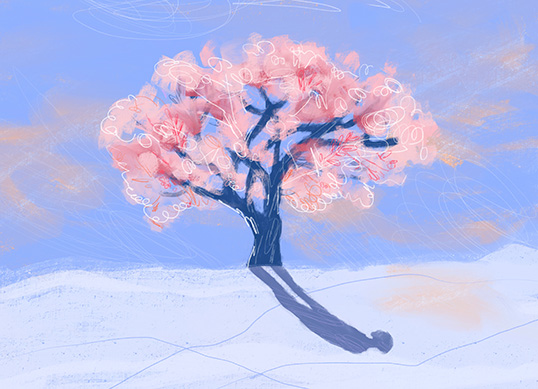For this week’s Translation Tuesday, Anastasia Afanas’eva constructs a world of shapes, shadows, and sensations that thematize dread and longing. The poem raises up images from the page in a maelstrom—a deluge of realizations that impress themselves on the reader like a flood. But the images’ actions are unreal; they are strung together in uncanny ways. In this poem, language acts absurdly, mirroring the unmistakable confusion of loss and of reckoning. The Hedgehog and its shadow are central, and show, in verse, how the most innocuous of things can become sutured with the weight of the universe.
Place: Ukraine
Translation Tuesday: “Hedgehog” by Anastasia Afanas’eva

About the dead, we cannot speak / for they are completed.
Blog Editors’ Highlights: Spring 2019
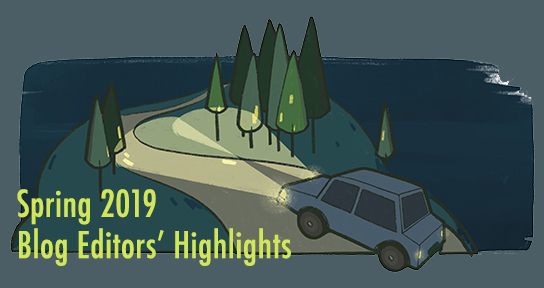
Join our blog editors as they explore everything the Spring 2019 issue has to offer!
The Spring 2019 issue of Asymptote, “Cosmic Connections,” features work from 27 countries and 17 different languages. If you’re not sure where to begin, our blog editors have you covered with recommendations for some of their favorite pieces, including an essay about an adventure in the Chernobyl Exclusion Zone, a story that jumps from medieval Jewish theology to the relationship between an Argentine father and son, and poems that offer us a glimpse into intimate moments in the city of Shanghai.
Asymptote’s newest issue is one of the journal’s best to date, meaning that it was nearly impossible to choose just one piece to highlight. In the interviews section, I found Dubravka Ugrešić’s comments on literary activism and Viet Thanh Nguyen’s discussion of the role of Marxism in his work particularly illuminating, while, in the special feature, Nancy Kline’s essay stood out for its focus on the often-overlooked role of the writer’s (and the translator’s) accent and spoken voice in the translation process. But I’d like to devote my highlight to an essay by a somewhat lesser-known writer, one who might otherwise get lost among the many big names that appear in this issue.
The Multilingual Carpathians: Weronika Gogola in Conversation
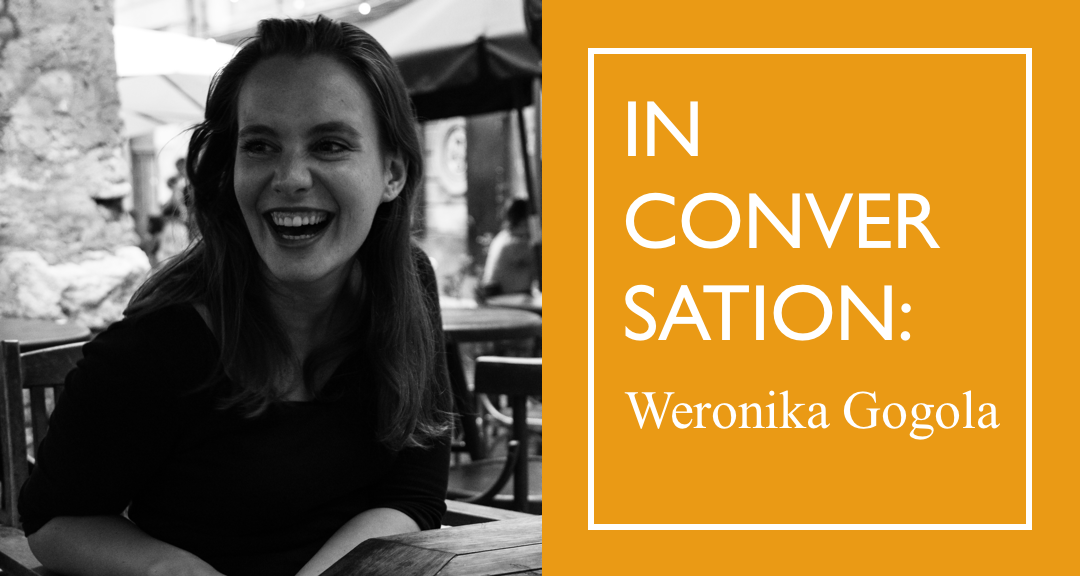
“Only by picking up a magnifying glass and taking a close look at things can you see the truth about yourself and others.”
Weronika Gogola is a Polish writer and translator from Slovak and Ukrainian. Her first autobiographical book Po trochu (Little by Little, 2017), which depicts her childhood in the small village of Olszyny in the Carpathian mountains, is composed of “stories from real life that are usually told bit by bit, in snippets and fragments.” The book was nominated for several literary prizes and in October 2018 won the Conrad Award for a prose debut. For the past three years, Gogola has been based in Bratislava, where Julia Sherwood, Asymptote’s Editor-at-Large for Slovakia, caught up with her last November.
Julia Sherwood: First of all, congratulations on winning the Conrad Award! I loved your book and think that the prize was more than deserved. What does it mean for you?
Weronika Gogola: This award is incredibly important to me, especially since, in the case of the Conrad Award, it’s not just the judges who decide but, first and foremost, the readers. I’m incredibly grateful to them. Besides, a prize is a kind of validation, as well as a bargaining chip for the future. I know that sounds unfair but that’s how the world works—the more prizes and nominations you have the more seriously you are taken. Unfortunately. But, of course, it’s nice to be appreciated. In addition, the Conrad Award includes a grant, which has allowed me to concentrate on my writing without financial worries.
JS: Your book is very firmly located in the world of your childhood. You grew up in a small village in rural Poland, yet ended up living abroad, and are currently based in Slovakia. Were you already living abroad while working on your book, and did the geographical distance give you a new perspective on the place, or did this make the writing more challenging?
In Conversation: Oksana Maksymchuk and Max Rosochinsky on Words for War
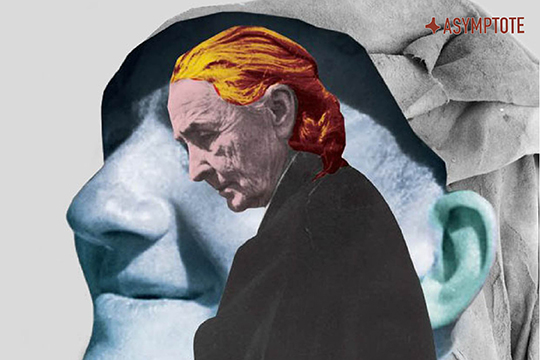
There’s a way in which great poetry goes beyond the specifics of language, time, and place, illuminating patterns.
Oksana Maksymchuk and Max Rosochinsky are award-winning poets from opposite ends of Ukraine, writing in Ukrainian and Russian, respectively. They work together as translators from Russian and Ukrainian to English, having lived in the US for over a decade. When Crimea, where Max is from, was annexed by Russia, and the war started in Eastern Ukraine in 2014, the geographic and linguistic differences they embody became markers of a conflict they were detached from, yet that was intimately close. The war gave Ukrainian poetry an impetus they could not ignore as translators, prompting them to assemble a collection that documents the war in its multiplicity, from various positions, modes of involvement, across languages. Words for War (Academic Studies Press, 2017), the resulting anthology, replants poetic testimonies of the war away from the local ground—there, the war loses some of its singularity—at once a document of this particular conflict and poems that speak of loss, pain and anger across borders. Today, Asymptote‘s Editor-at-Large for Hungary, Diána Vonnák, discusses this groundbreaking project with Oksana and Max.
Diána Vonnák (DV): When I read the title of your collection, Wilfred Owen came to my mind as one of those poets who became iconic for English war poetry. He wrote this in 1918, just before he died: “This book is not about heroes. English Poetry is not yet fit to speak of them. Nor is it about deeds, or lands, nor anything about glory, honour, might, majesty, dominion, or power, except War. Above all I am not concerned with Poetry. My subject is War, and the pity of War.” These claims are strong and for me they resonated with what you wrote in the preface: “Like broken furniture and mutilated bodies, these poems are traces of what had happened, as well as evidence that it did really happen.” What do you think about the relationship between poetry and war, the aesthetic and the political?
Oksana Maksymchuk and Max Rosochinsky (OM/MR): Words for War is a provocative title. It’s also a difficult title to pull off, in that it can appear glib, easily interpreted in a hortative aspect: “Let’s get ready for war, sing some war songs, and say some war words!” For better or for worse, it’s not that kind of book. Our starting point was a series of observations: there’s a war in Ukraine, and people there think about it and talk about it. Politicians and administrators make speeches about it. Journalists and reporters cover it. It fills news channels and newspapers. Youtube users upload amateur videos from cities affected by war, and your own Facebook friends take different sides. In the streets, you see people in military uniforms; and you see civilians reacting to them, expressing a range of responses from gratitude to overt hostility. You see young men with missing limbs, with deformed faces. And then there are the endless witness reports. Because many people have been to war, and still more have been to the war zone, and they have stories to tell, and stories they prefer to be silent about. In short, war is ever-present, and it uses up a lot of words.
My 2017: Diána Vonnák
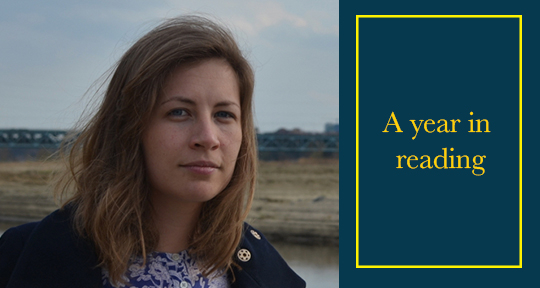
“Fiction, nonfiction—the two are bleeding into each other all the time.” They do, and the result is often great.
Editor-at-Large for Hungary Diána Vonnák, who joined us in October this year, moved between fiction and nonfiction titles in 2017. Some of these books blurred the lines between both and probed the relationship between invented worlds and our own.
I spent much of this year reading books I would have trouble classifying either as fiction or nonfiction. They reminded me of Geoff Dyer, who began his “Art of Nonfiction” interview with the Paris Review by protesting the division: “Fiction, nonfiction—the two are bleeding into each other all the time.” They do, and the result is often great. Here are my favourites from 2017.
I started the year with Philippe Sands’ East West Street: On the Origins of Genocide and Crimes Against Humanity, an engrossing family memoir-cum-intellectual history. Sands, a human rights lawyer, sets off on a journey to recover his own family history—which leads him back to Lviv, a city in Western Ukraine. Before the Holocaust eliminated its prolific Jewish life, Ralph Lemkin and Hersch Lauterpacht, who would later become legal scholars, both studied there. Just like Sands’ own grandparents, Lemkin and Lauterpacht left their hometowns and were spared from the massacre that eradicated their entire families. Sands combines a precipitating personal memoir with a vivid reconstruction of how the Holocaust led these two thinkers to develop the notions, in Lemkin’s case, of genocide and, in Lauterpacht’s case, of crimes against humanity. Sands shows how their ideas originated from their personal lives, and as he follows Lemkin and Lauterpacht through emigration, he reconstructs their respective intellectual environments. It all culminates in the milestone legal debates that took place after the Holocaust—Sands shows us how Lemkin’s and Lauterpacht’s own compelling circumstances shaped their arguments. It is rare to see legal history woven so seamlessly into personal reflection.
On Żanna Słoniowska’s The House with the Stained Glass Window

A strikingly crafted window into how our lives are a mosaic of the things that happened before us.
Translated from the Polish by Antonia Lloyd-Jones. London, England: MacLehose Press, 2017. 240 pages. £12.99.
Toward the middle of The House with the Stained Glass Window, the Ukrainian-Polish writer Żanna Słoniowska’s debut novel, the unnamed narrator tells us that her great-grandmother occasionally falls into fits of hysterical sobbing, which her grandmother explains as having to do with “the past.” “I imagined ‘the past’ as an uncontrolled intermittent blubbering,” the narrator says. This definition is not a far cry from the idea of the past portrayed in The House with the Stained Glass Window: not blubbering, but certainly not controlled by human forces, intermittently entering the present day until it infiltrates it, saturates it, and finally becomes indistinguishable from it.
The novel centers around four generations of women who live under the same roof in Lviv, in a house noted for its enormous stained glass window. The window sets the present-day plot in motion: it is because of the window that the novel’s narrator, who we only know as Marianna’s daughter, meets Mykola, her mother’s former lover, and begins an affair with him herself. A relationship like that would provide enough internal and external conflict to fill a novel to its brim, but Słoniowska does not dedicate much page space to it. Instead, if anything, the affair serves as a springboard to the past, to exploring the irresistible pull of it.
What’s New in Translation? May 2017

We review three new books available in English, from Yiddish and Hebrew poetry to an extraordinary Russian account of exile.
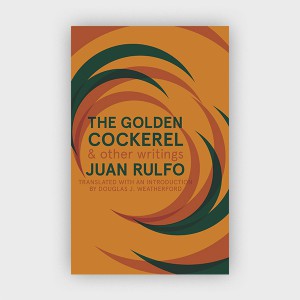
The Golden Cockerel & Other Writings by Juan Rulfo, translated by Douglas J. Weatherford, Deep Vellum
Reviewed by Nozomi Saito, Senior Executive Assistant
Juan Rulfo’s prominence within the canon of Mexican and Latin American authors has been undeniable for some time. Regarded by Valeria Luiselli as one of the writers who gave her a deeper understanding of the literary tradition in Mexico and the Spanish language, and depicted by Elena Poniatowska as a figure deeply rooted in Mexican culture, it is clear that modern Mexican and Latin American literature would not be what they are without Rulfo. Indeed, Rulfo often has been credited as the figure to whom the Latin American boom of the 1960s and ‘70s is indebted, and Gabriel García Márquez has said that it was because of Rulfo’s works that the former was able to continue writing and ultimately produce One Hundred Years of Solitude.
Yet for all the recognition that Rulfo’s works have so rightly earned, there has been a persistent misconception that he only published two works of fiction, The Plain in Flames (El Llano in llamas, 1953) and Pedro Páramo (Pedro Páramo, 1955). The Golden Cockerel (El gallo de oro, c. 1956) for too long remained excluded from Rulfo’s oeuvre, even being miscategorized as a text originally intended for the cinematic screen. To reclaim and secure its position in Rulfo’s canon, Douglas J. Weatherford has brought forth The Golden Cockerel and Other Writings, which provides deep insight into the work, ruminations, and personal life of the legendary writer.
The result is a text that is refreshing and diverse. The titular story follows the rise and fall of Dionisio Pinzón, an impoverished man whose crippled arm prevents him from farm labor, the only viable work in the town, and whose destiny changes when someone gives him a golden cockerel that has been badly beaten, having comprised the losing side of a cockfight. While the majority of the story follows Pinzón’s migration in pursuit of wealth, his path eventually intersects with that of the singer Bernarda Cutiño, familiarly called La Caponera, whose own migratory wanderings lead them from one town to the next, to various cockfights throughout Mexico.
Highlights from the Asymptote Winter Issue

Our editors recommend their favorite pieces from the latest issue.
First off, we want to thank the five readers who heeded our appeal from our editor-in-chief and signed up to be sustaining members this past week. Welcome to the family, Justin Briggs, Gina Caputo, Monika Cassel, Michaela Jones, and Phillip Kim! For those who are still hesitating, take it from Lloyd Schwartz, who says, “Asymptote is one of the rare cultural enterprises that’s really worth supporting. It’s both a literary and a moral treasure.” If you’ve enjoyed our Winter 2017 issue, why not stand behind our mission by becoming a sustaining member today?
*
One week after the launch of our massive Winter 2017 edition, we invited some section editors to talk up their favorite pieces:
Criticism Editor Ellen Jones on her favorite article:
My highlight from the Criticism section this January is Ottilie Mulzet’s review of Evelyn Dueck’s L’étranger intime, the work that gave us the title of this issue: ‘Intimate Strangers’. Mulzet translates from Hungarian and Mongolian, but (being prolifically multilingual) is also able to offer us a detailed, thoughtful, and well-informed review of a hefty work of French translation scholarship. Dueck’s book is a study of French translations of Paul Celan’s poetry from the 1970s to the present day (focussing on André du Bouchet, Michel Deguy, Marthine Broda, and Jean-Pierre Lefebvre) and is, in Mulzet’s estimation, ‘an indispensable map for the practice of the translator’s art’. One of this review’s many strengths is the way it positions Dueck’s book in relationship to its counterparts in Anglophone translation scholarship; another is its close reading of passages from individual poems in order to illustrate differences in approach among the translators; a third is the way Mulzet uses Dueck’s work as a springboard to do her own thinking about translational paratexts, and to offer potential areas for further research. The reviewer describes L’étranger intime as ‘stellar in every way’—the same might be said of the review, too.
Chief Executive Assistant Theophilus Kwek, who stepped in to edit our Writers on Writers section for the current issue, had this to say:
When asked to pick a highlight from this issue’s Writers on Writers feature, I was torn between Victoria Livingstone’s intimate exploration of Xánath Caraza’s fascinating oeuvre and Philip Holden’s searching essay on Singapore’s multilingual—even multivocal—literary history, but the latter finally won out for its sheer depth and detail. Moving from day-to-day encounters with language to literary landmarks of the page and stage, Holden surveys the city’s shifting tonalities with cinematic ease, achieving what he himself claims is impossible: representing a ‘polylingual lived reality’ to the unfamiliar reader. And as a Singaporean abroad myself, Holden’s conclusion sums it up perfectly: the piece is ‘a return to that language of the body, of the heart’.
Visual Editor Eva Heisler’s recommendation:
Indian artist Shilpa Gupta addresses issues of nationhood, cultural identity, diaspora, and globalization in complex inquiry-based and site-specific installations. The experience of Gupta’s work is explored by Poorna Swami in her essay ‘Possessing Skies’, the title of which alludes to a work in which large LED light structures, installed across Bombay beaches, announce, in both English and Hindi, ‘I live under your sky too.’ Gupta’s work, Swami writes, ‘positions her spectator in an irresolvable conversation between the abstracted artwork and a tangible sense of the so-called real world, with all its ideologies, idiosyncrasies, and fragilities’.
The Belarus Free Theatre takes its highly politicized “Burning Doors” on the road
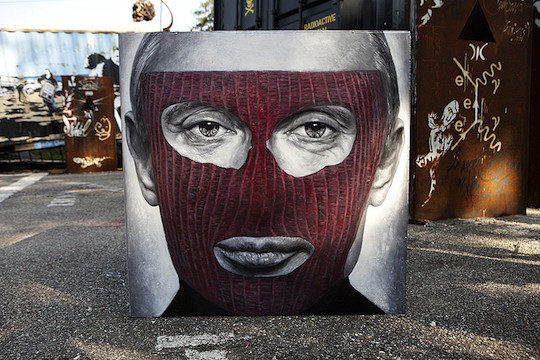
In order to transmit the trauma experienced by Pavlensky, Sentsov, and Alyokhina, playwright Nicolai Khalezin also traumatizes the audience.
This hell-bent play by what The New York Times has called “[t]he world’s most visible and lionized underground theater” keeps finding ways to pull the rug from under the feet of astonished audiences.
“It will not be his balls, but ours, behind the door,” a buffoonish technocrat rants to his doppelgänger, as the two leisurely defecate in their ministerial toilets, in unison. Moments later, the other one expounds on the evils of modern art: “Before Picasso, art was normal.” (As it turns out, he owns two of the deviant’s paintings.) When they finish shooting the shit, and shitting, they pull up their government-issued trousers to discover a lack of toilet paper. Following the pair’s exit, masked bandits inexplicably slip onto the stage to replenish the needed supplies in a sort of winking parenthetical—or, better still, a puckish middle finger.
These gag lines satirizing the absurdities and hypocrisies of dictatorships—specifically the Putin regime—are the sort of irreverent zingers that some of us relish: comedic relief with a reactionary backhand, using both shock and shtick to slice through inaction and fear. It’s a particular specialty of Burning Doors, performed by the UK-based Belarus Free Theatre, which celebrated its tenth anniversary last year despite being banned in its home country. Currently in the second staging of its UK tour at the Soho Theatre, one of London’s essential performing arts labs, the show is a wielding and warped montage of vignettes based on the testimonies of artists targeted by Putin. These include the Russian artist Petr Pavlensky, who nailed his own testicles, referenced above, to the cobblestones of Red Square; the Ukrainian filmmaker Oleg Sentsov, who is currently serving a twenty-year prison sentence in the Russian Far East; and the feminist punk rock group Pussy Riot’s Maria Alyokhina.
In Review: Y.T. by Alexi Nikitin
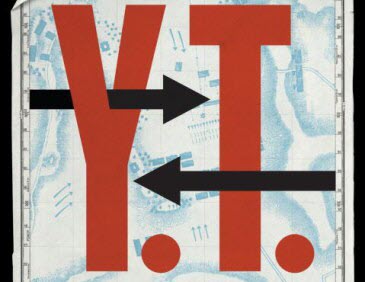
"At the heart of Y.T. is an obvious but nonetheless suitable message. The citizens of the former Soviet Union have been hustled."
“Play is older than culture, for culture, however inadequately defined, always presupposes human society, and animals have not waited for man to teach them playing.” This is how the Dutch historian Johan Huizinga begins Homo Ludens: A Study of the Play Element in Culture. Written in 1938, just prior to the Second World War, the book might have been wholly contretemps if the author hadn’t deftly considered how combat and politics are each shot through with elements of play and gamesmanship. Who are generals and politicians if not, at least in part, overgrown boys wagering the fate of nations? The stakes were outrageous and the rules inhumane, but then, as Huizinga put it, play doesn’t need humans, enlightened humans least of all.
The cruel aspects of play are made apparent in Y.T. a recent novel by the Ukrainian Alexi Nikitin, translated by Anne Marie Jackson and published this April by Melville House. The title is an initialism, shorthand for “your turn” a term used in a strategy game developed by bored students assigned to agricultural duty in the Ukrainian countryside. The action begins in 1984. Associations with George Orwell aside, the date is an unlucky one for the narrator Alexander Davidov and his four companions. The decrepitude of the Soviet system has become all too apparent for those living within it, but the reforms of Perestroika have yet to come. The students have gone to university to study radiophysics, but this is immaterial to their job helping peasants grow apples. As city kids, the students are wholly unsuited to the task. There is nothing to be done except play cards and dine on country cooking. Better entertainment is needed. Using algorithms learned in their university studies, they partition the Soviet Union into a set of fictional entities that vie with each other for military, economic, and political supremacy. READ MORE…

